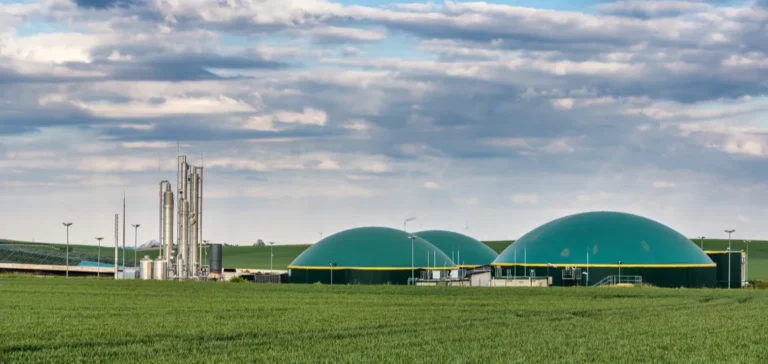Investment and asset management group Qualitas Energy has officially launched its first biomethane production site in the United Kingdom. The facility, operated by its subsidiary Acorn Bioenergy, is located on Three Maids Hill, near Winchester in southern England. The site will process up to 83,600 tonnes of agricultural waste per year to produce more than 120 GWh of biomethane, equivalent to the annual heating demand of over 9,000 households.
Strategic rollout of a site network
The Three Maids facility is the first stage of a broader project led by Qualitas Energy through Acorn Bioenergy. The group plans to deploy a dozen similar units in England and Scotland. Together, these plants will inject more than 1.5 TWh of biomethane annually into the UK’s national grid through four gas injection hubs across the country.
The commissioning of this first site has already created 15 direct jobs, with potential impact on nearly 50 positions in engineering, agriculture, and local infrastructure sectors. The model is based on the valorisation of agricultural by-products, such as slurry, crop residues, and cover crops, converted into renewable energy.
Optimising agricultural waste and creating local value
In addition to producing biomethane, the process generates nutrient-rich digestate redistributed to partner farms, replacing imported synthetic fertilisers. This model aims to strengthen the local anchoring of activities while reducing the country’s energy dependence. According to published data, the facility will prevent the emission of around 30,000 tonnes of carbon dioxide (CO₂) annually.
The unit is part of a long-term development strategy for Qualitas Energy, which aims to make its UK platform a central player in renewable gas production. The group claims to control the entire project lifecycle, from land acquisition to site operation.
Objective: supply 25% of the UK biomethane market
The vision led by Acorn Bioenergy is to provide one quarter of the national biomethane demand in the coming years. By positioning the Three Maids site as a reference platform, the company seeks to demonstrate the economic and industrial viability of biomethane derived from agriculture.
According to internal projections, the development of planned facilities will support both the decarbonisation of heating uses and the structuring of an agricultural-energy value chain across the United Kingdom. The proposed model is based on flexible infrastructure designed to complement intermittent sources such as wind and solar.






















